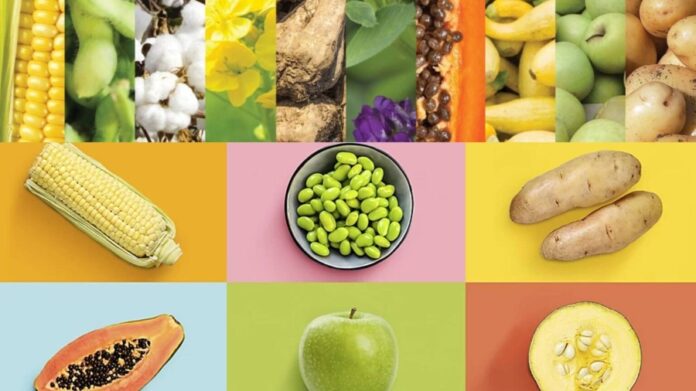A study by Gbashi, et al. (2021) titled “Food safety, food security and genetically modified organisms in Africa: a current perspective” published in the Biotechnology and Genetic Engineering Reviews by Taylor & Francis shows that Genetically Modified Organisms (GMOs) offer opportunities to improve crop yields, resistance to pests, and nutritional quality, which can help address food insecurity.
“
GMOs offer promising solutions for improving food security in Africa, yet adoption remains cautious due to safety concerns.-Gbashi, et al. 2021
This article delves into the pressing challenges of food safety and security in Africa, with a particular focus on the potential role of genetically modified organisms (GMOs) in addressing these issues. Africa is grappling with severe food insecurity, driven by multiple complex factors, including widespread poverty, the impacts of climate change, and rapid population growth, which together threaten the region’s ability to achieve stable food supplies. The COVID-19 pandemic has compounded these challenges by disrupting food supply chains, reducing household incomes, and limiting access to essential resources, intensifying hunger and malnutrition across the continent. In this context, GMOs present a promising yet controversial solution. By enabling crops with higher yields, enhanced resistance to pests and diseases, and improved nutrient profiles, genetically modified crops could play a critical role in combating food insecurity and addressing malnutrition. For example, pest-resistant GMO varieties can reduce the need for chemical pesticides, potentially lowering production costs and environmental impacts, while nutrient-fortified GMOs can help address deficiencies in key vitamins and minerals, particularly in vulnerable populations. Despite these potential benefits, the adoption of GMOs in Africa remains cautious and gradual. Concerns around GMO safety, environmental impacts, and the potential influence of multinational corporations have led to varied opinions among policymakers, farmers, and the public. While some stakeholders argue that GMOs can be part of a sustainable solution to food insecurity, others worry about potential health risks and the loss of traditional farming practices. Consequently, the path toward integrating GMOs into African agriculture is complex, requiring careful consideration of both the scientific evidence and the socioeconomic context.
How the Study was Conducted
The study on food safety and security challenges in Africa, particularly focusing on GMOs, was conducted through a comprehensive review of existing literature and data. The researchers analyzed various sources, including scientific journals, policy documents, and reports from international organizations. They also considered case studies from different African countries to understand the practical implications and outcomes of GMO adoption.
What the Authors Found
The authors found that Africa faces significant food security challenges, with 20% of its population undernourished. Factors include poverty, climate change, and conflicts. The study also found that Genetically Modified Organisms (GMOs) offer opportunities to improve crop yields, resistance to pests, and nutritional quality, which can help address food insecurity. Despite the benefits, the adoption of GMOs in Africa has been slow due to safety concerns and contrasting views.
Why is this important?
Food Security: With a significant portion of Africa’s population facing hunger and malnutrition, finding sustainable solutions like GMOs can help improve food availability and quality.
Economic Impact: Enhancing agricultural productivity through GMOs can boost the economy by increasing farmers’ incomes and reducing reliance on food imports.
Environmental Benefits: GMOs can reduce the need for chemical pesticides and fertilizers, leading to more sustainable farming practices and less environmental degradation.
Health Improvements: By enhancing the nutritional content of crops, GMOs can help combat nutrient deficiencies and improve overall public health.
Policy Development: The study’s recommendations can guide policymakers in creating supportive frameworks for the safe and effective adoption of GMOs, ensuring that the benefits are maximized while addressing safety concerns.
What the Authors Recommended
- The authors advocate implementing consistent and effective biosafety regulations across African countries to ensure the safe use of GMOs.
- The authors emphasize developing policies that encourage the adoption of GMOs while addressing safety concerns and public perceptions and investing in research and development, as well as training for farmers and stakeholders, to effectively utilize GMO technology.
- In addition, the authors emphasize encouraging collaboration between governments, international organizations, and the private sector to support GMO initiatives and share best practices.
In conclusion, while genetically modified organisms hold significant potential to address Africa’s food security and nutritional challenges, the path forward demands careful consideration. By implementing robust biosafety regulations, fostering collaboration between key stakeholders, and prioritizing public education, African countries can maximize the benefits of GMOs while addressing public concerns. Through balanced and informed policy decisions, GMOs could serve as a sustainable and transformative tool in the fight against hunger, malnutrition, and economic instability across the continent.
















 The African Research (AR) Index is a comprehensive scholarly directory and database focused explicitly on journal publishers that publish and disseminate African research.
The African Research (AR) Index is a comprehensive scholarly directory and database focused explicitly on journal publishers that publish and disseminate African research.

